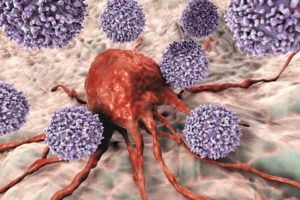“Remodeling” Mesothelioma Cells May Improve Responsiveness to Immunotherapy
 Italian researchers are experimenting with the idea of remodeling mesothelioma cells from the inside out to improve their responsiveness to immunotherapy.
Italian researchers are experimenting with the idea of remodeling mesothelioma cells from the inside out to improve their responsiveness to immunotherapy.
Malignant mesothelioma is highly resistant to standard cancer treatments. Immunotherapy is widely considered to be one of the most hopeful new approaches to this cancer. But this approach works better for some people than it does for others.
The difference may lie in the genes. Scientists at University Hospital of Siena believe that manipulating the gene expression of mesothelioma cells could be the key to bolstering responsiveness to immunotherapy.
Mesothelioma, Genetics, and Responsiveness to Immunotherapy
Immunotherapy is a method of treating disease by using the body’s natural immune response. This can mean trying to attract more immune cells to the site of the cancer. It can also involve making cancer cells more susceptible to an immune attack. Checkpoint inhibitors like Keytruda and Nivolumab are examples of immunotherapy drugs.
But these drugs face an up-hill battle with mesothelioma. Like some other types of cancer, mesothelioma cells can modulate their own responsiveness to immunotherapy. They release proteins that change the microenvironment around them. This altered microenvironment is hostile to cancer-killing immune cells.
If doctors had a way to make this microenvironment more hospitable, scientists theorize that it could improve mesothelioma’s responsiveness to immunotherapy.
Altering the Immune Microenvironment Through Epigenetics
Gene expression influences every aspect of a cell’s life, including its responsiveness to immunotherapy. But not all gene expression is set from birth. Some behaviors and environmental factors can change how the genes work.
The process through which mesothelioma cells influence gene activity without changing their DNA is called epigenetics.
Certain drugs can also trigger epigenetic changes. The new Italian study focused on epigenetic drugs to change the mesothelioma tumor microenvironment. The goal was to see if any of these drugs could improve responsiveness to immunotherapy.
Of the drugs studied, guadecitabine appeared to have the biggest impact.
“Treatment with guadecitabine led to the activation of genes involved in several immune-related functional classes mainly in the sarcomatoid subtype,” writes author Maria Fortunata Lofiego of the Center for Immuno-Oncology at the University Hospital of Sienna.
Dr. Lofiego and her colleagues tried different epigenetic drugs on several types of mesothelioma in the lab. They conclude that drugs like these have the potential to increase responsiveness to immunotherapy in mesothelioma tumors and deserve further study.
“Our results contribute to providing the rationale to develop new epigenetically-based immunotherapeutic approaches for malignant pleural mesothelioma patients, potentially tailored to the specific histologic subtypes,” writes Dr. Lofiego.
The article appears in a recent issue of Epigenomes.
Source:
Lofiego, M, et al, “Epigenetic Immune Remodeling of Mesothelioma Cells: A New Strategy to Improve the Efficacy of Immunotherapy”, December 14, 2021, Epigenomes, https://www.mdpi.com/2075-4655/5/4/27





